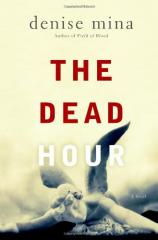The Dead Hour
Review
The Dead Hour
Working-class heroes aren't your typical crime-solvers in the
British mystery world. There is the occasional sidekick from humble
beginnings, like Barbara Havers, the upper-crust Lynley's partner
in Elizabeth George's thrillers, or Kate Miskin, who backs up P.D.
James's aloof Adam Dalgleish. But mostly they are cast in a
Sherlockian mode: The intelligence sufficient to bring a murderer
to justice (and the time to do it in) is associated with a finely
honed aristocratic mind and a genteel, poetry-writing,
independent-income sort of existence.
THE DEAD HOUR is not one of those polite mysteries.
Twenty-one-year-old Paddy Meehan is the deliciously gritty junior
reporter we first encountered in Denise Mina's FIELD OF BLOOD.
Although Paddy isn't exactly a detective --- she has been banished
to the night shift at The Scottish Daily News, where she
chases police calls, hoping to come up with a career-making scoop
--- she is smart, persistent and fearless. She is also achingly
vulnerable (overweight, perpetually exhausted by her weird working
hours, not quite over her wimpy ex-boyfriend yet capable of
inappropriate lust for an attractive cop) and flat-out poor.
That's why the opening scene is so compelling. When the cops are
summoned to the scene of what appears to be a domestic dispute in a
wealthy suburb of Glasgow, Paddy follows. At the door of an elegant
villa is a handsome, expensively dressed man; in the background is
a blond woman who is bleeding from an assault but refuses to press
charges. That doesn't surprise Paddy, whose sister Caroline
regularly flees --- and returns to --- her abusive husband. What
does shock her is the 50-pound note the man presses into her hand
to keep the story out of the paper. It's clear that he has paid off
the policemen as well. Paddy is conscience-stricken already: "I
don't know if we should have left her there," she says to her
driver, Billy, as they head into the night. "Don't feel too bad,"
he replies. "They're not like us, rich people.... She could leave
him if she wanted."
The conversation and the bribe emphasize the sense of class
difference that runs deep in this novel. To Lynley or Dalgleish, 50
quid would mean nothing. To Paddy, it's a windfall: She lives with
her parents and siblings; the whole family is out of work (the book
is set in the bleak economic climate of the Thatcherite '80s), with
only her wage at the paper to keep them going. What she will do
about the hush money becomes an urgent moral question the next day
when she learns that the blonde, Vhari Burnett, a progressive
lawyer with ties to Amnesty International, was murdered brutally
later that night. Now Paddy has two things to be guilty about:
having taken the money and having abandoned a decent woman.
Eating too much is a third thing Paddy wrestles with. Her
relationship with food defines her constant internal war between
impulse and discipline (she eats cold baked potatoes and canned
beans that make her fart; the only thing she can't stand is cottage
cheese with pineapple: "She could hardly look at it now, after a
reckless weeklong attempt to eat nothing else"). Her appetite for
sweets, starch and sex (the scene in which Paddy and the policeman
Burns hook up in his car is one of the best I've read) can't be
tamed no matter how hard she tries; this is what makes her so madly
attractive, to men and to readers...even if it also gets her into
big trouble.
But the trouble Paddy can get into if she eats the wrong things,
sleeps with the wrong men, or tells on crooked cops or judges is
nothing compared to the doomed trajectory of Kate, a cocaine addict
who has just stolen a bag of the stuff from people who shouldn't be
messed with. Hers is the second narrative voice in THE DEAD HOUR,
and as an account of Kate's dangerous flight alternates with
Paddy's investigation, it gradually becomes clear how the two plot
lines connect. Here, too, Mina creates an electrifying counterpoint
between a woman born to privilege and beauty, and one who wasn't:
When the paper puts up Paddy at a hotel for her own protection,
it's the first time she's ever slept in a room by herself (at home,
she shares). There is also a terrific scene in which Paddy meets
Trisha, her mother, for tea --- an awkward, affectionate encounter
between a woman of limited education and ambition and a daughter
who now inhabits a different world. In contrast to Vhari's
well-heeled family, where parents and children may not connect for
years, Paddy reflects that "the Meehans were warm. Fraught but
warm."
Yet THE DEAD HOUR ends by making us think about the way all women,
rich or poor, struggle not to be victims. Variously they try to
sidestep their gender-determined fate through drugs, religion,
food, work, politics and sheer guts. Speaking with a witness, "a
tall woman with an aristocratic nose and thick, lush gray hair," at
an Amnesty demonstration for the release of Nelson Mandela, Paddy
seems to recognize herself: "They smiled at each other, these two
working women, both keeping jobs from needy men, betraying nature
by escaping the kitchen sink, these two women who were out in the
world, active not passive, subjects not objects."
Okay, that's a little didactic, but Paddy is way too idiosyncratic
to be annoyingly p.c. I absolutely fell in love with her, and if I
have any reservations about this book it's that she is so
astonishingly vivid that the story itself pales in comparison. Mina
seems to recognize this in her ending, which is no longer about the
case; rather, it is a quintessentially female cliffhanger that all
but ensures there will be another book with Paddy in it. I can't
wait.
Reviewed by Kathy Weissman on December 29, 2010





